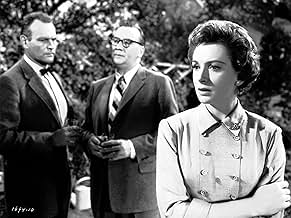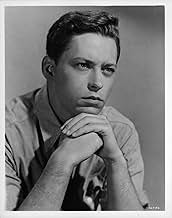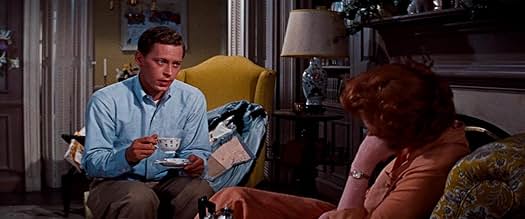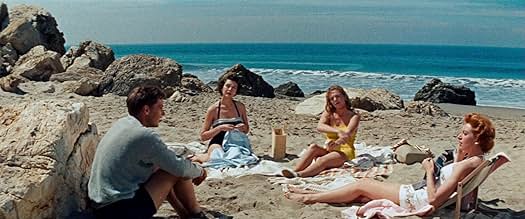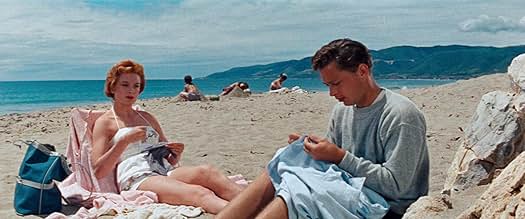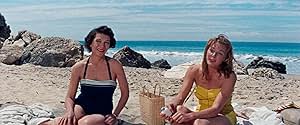Adicionar um enredo no seu idiomaA new senior at a boy's prep school, finds himself harassed by the machismo culture of his classmates and the unfeelingly behavior by his father, only being treated with decency by his roomm... Ler tudoA new senior at a boy's prep school, finds himself harassed by the machismo culture of his classmates and the unfeelingly behavior by his father, only being treated with decency by his roommate and with affection by the coach's wife.A new senior at a boy's prep school, finds himself harassed by the machismo culture of his classmates and the unfeelingly behavior by his father, only being treated with decency by his roommate and with affection by the coach's wife.
- Indicado para 1 prêmio BAFTA
- 1 vitória e 3 indicações no total
- Bob
- (não creditado)
- Alex
- (não creditado)
- Boy in Soda Fountain
- (não creditado)
Avaliações em destaque
Yes, Tea and Sympathy addresses homosexuality -- but there isn't a single bit of *actual* homosexuality in the film. It's not about actual homosexuality but about perceived homosexuality... and the fear thereof. It's completely obvious within five minutes that Tom Lee is completely in love with Laura, and there's nothing whatsoever in the film that suggests he might feel romantic or erotic attraction to men... nor is there anything whatsoever in the film that suggests that he's confused about whether or not he likes men (or men and women).
Of course, back in the fifties, most, really all, film language that dealt with homosexuality was coded. Things *stood* for homosexuality, rather than directly displaying it. So, one could be tempted to say that Tom Lee is a coded closet case. But, far too much of the script is explicitly about the external challenge of his being seen as, or feared to be, queer; while absolutely none of it is about an internal struggle with his orientation. He struggles with the perception (his own and others) of his masculinity, but nothing in the film indicates Tom himself might think he's queer.
And, again, his obvious infatuation with Laura permeates the whole film. He doesn't *stalk* her at the beginning because he needs a sympathetic ear...
And when she tries to set him up on a tea date with a girl, there's no sense that she fears Tom is queer, that she must straighten him out. But she *is* horribly concerned that they keep others from thinking it. She even has one line of dialog in which she speaks to him directly of the need to "nip this in the bud" or somesuch. Even in a 1956 film, it wouldn't make any sense to think that this woman would think a tea date would "straighten" Tom out; but it does make sense that she would believe it could be part of repairing his reputation.
The closest the film ever gets to suggesting the potential (much less the actuality) of Tom being queer is when Laura voices fears that Tom being treated "not like a man" could lead him to *become* unsure of himself as a man... If you want to infer she fears he *might* become queer because of this, there's room especially given the overall coding Hollywood demanded of such material, but, again, you've got everything else in the film to work against this interpretation. And it's an interpretation of what Tom *might* be in the future, not what he is in the timeframe of the film itself.
Furthermore, even this is only the perception of another character -- not Tom himself displaying any indication that HE fears he may one day "become" queer.
Tom's conflict revolves around his trying to navigate his way in the world as the *atypical* man he is, find his identity as a man, and be accepted as such... in a world that doesn't want to.
And it's *other* people, not Tom, who clearly (altho thru coded film language) see him as queer, or fear he might be.
And while I understand that Anderson's play was more forceful in suggesting that the housemaster was a repressed homosexual, it's *really* stretch to see it in the film version. The building blocks of the coding are there (yeah, he hangs out with the boys and roughhouses with them, and he neglects his wife), but the film also goes to considerable lengths to paint him as a "typical" man who's lost interest in his marriage once he's claimed his wife. What with that, and the context of a film in which the main character is so clearly painted as a perceived homosexual rather than as an actual one (even in potentiality), the coding is so incredibly watered down that it's really not even there at all, effectively.
Tea and Sympathy is a pretty compelling film about the definitions of masculinity and gender role enforcement and homophobia. It's really upsetting to see that homophobia and misogyny and incredible pressure to conform on screen, but it is compelling. Even if Minnelli turned out to be a horrible choice for director.
His avoidance of close-ups reveals him to be, in this case at least, what feels to me like a very selfish director. More than the topic, more than the writing, it's the performances of Kerr and Kerr that make this film. They are constantly having to fight Minnelli's apparent desire to keep them at a visual distance from us. I guess in a way it's a credit to both the stars and Minnelli himself that he could get such strong work from them despite the sparseness of close-ups that the film so desperately needed.
It's as if Minnelli thought that he was -- or should be -- directing a pageant rather than a drama. "Look, I can make even an intimate, human drama great in WIDESCREEN!!!" Except that you can't, Vincent. I don't care about you in Tea and Sympathy, Mr. Minnelli, I care about Tom and Laura. Give me the characters!
Matthew
I didn't find this movie dated at all. Not only does it offer a glimpse of what life was like in the 1950's, which should have some historical significance to younger folks today, but its message regarding the stifling conditions of rigid social conformity is ageless. Although it is obviously a stage adaptation, praise goes to director Vincente Minnelli for so ably bringing it to the wide screen. The three leads, Deborah Kerr, John Kerr (no relation), and Leif Erickson, who all revived their original Broadway roles, are exceptional. I also loved the scene when Al (Daryl Hickman), Tom's socially pressured roommate, attempts to provide Tom with tips on how to appear more manly to the world. Norma Crane, who wonderfully played Golde in the film version of "Fiddler on the Roof", perfectly portrays the very cruel town harlot, Ellie Martin. Ironically, Edward Andrews depicts Tom's demanding father as anything but manly, perhaps intentionally. Be as I say, Tommy, not as I am.
While Tom at first appears to be the focus of the film, the stories of Laura and Bill Reynolds, his dorm house parents, slowly begin to overshadow Tom's miserable situation. This represents some excellent work by screenplay writer Robert Anderson, who also wrote first-rate scripts for "The Nun's Story", "The Sand Pebbles, and "I Never Sang For My Father." And what is Bill Reynolds doing at the end of the movie? Listening to phonograph records by himself. What's the matter with him? My only criticism is that it runs a bit long and could have been reduced in length without losing its powerful impact.
Women were still patronized, there were still clear role boundaries (witness the scene where Tom is knitting and catches derision for spending ten minutes in a sewing circle.) Not sure why that was a crime of the century, but whatever.
Deborah Kerr is tender and memorable as an unhappy wife to the school master at a prep school who realizes her marriage is a sham. She realizes this when she sympathizes with a student and resident at her home, a confused young man who simply is shy and has doubts about his future. There are some nuances regarding sexuality, but in all honesty that was a side-story, from what I inferred.
The message I take away from this film is not simply about ostracism and hatred; Minnelli as director also addresses female emotion, the reasons why Kerr empathizes with the young man, and how he eventually moves on. In the long rung, it is life affirming, although rather opaque in its message.
Discrimination and hatred take many forms, and sometimes the subtler forms are most repellent. Highly recommended. 8/10.
The story revolves around gender roles. The film uses stereotypes, like the "he-man" and the "sensitive boy" to expose persecution by stereotyping. It is a product of its time in degree only. Conventions in acceptable gender behavior still prevail. And there have always been pockets of society that impose their own rules of conduct on their members. These conspiracies of prejudice depend on bullying to enforce conformity.
The driving force behind such movements is fear of that which is different or not understood. This is a film about homophobia, not homesexuality. John Kerr does a good job portraying Tom, the persecuted teen. He is not unlike most teens; he just doesn't conform to the prevailing "norms". Much is made about the concept of a "regular guy"---a laughable archetype when viewed objectively. It doesn't matter who you are or what you believe in as long as you conform and, thusly, assuage the fears of those around you.
The relationship between Tom and his father is central to the story. Like the coach, Tom's father has been conditioned to expect certain behaviors from himself and others. His disappointment in his son is extremely damaging. It is interesting to compare this film's depiction of the father-son relationship with that in "Rebel Without a Cause". They are different, but in each the dynamics are painful and long-reaching. It is also worth mentioning that Tom is not like Sal Mineo's character in "Rebel", but they have similar psychological repercussions.
The film ends with the reading of a letter. It's an ending that was added to conform to prevailing standards and, as such, adds nothing of value. Better to ignore it and let the film stand on its own merits, without the cowardly addendum.
Você sabia?
- CuriosidadesBringing the play to the screen resulted in a years-long struggle with the production code office and the Catholic National Legion of Decency because of the play's inclusion of homosexuality, adultery and prostitution. At one point there was consideration that the film be produced by an independent production company outside of the studio system.
- Erros de gravaçãoWhile Tom Lee (Class of 1946) is still in school, Laura Reynolds drives a 1950 Dodge.
- Citações
Laura Reynolds: Manliness is not all swagger and mountain climbing. It's also tenderness and gentleness and consideration.
- ConexõesFeatured in Homo Promo (1991)
- Trilhas sonorasThe Joys of Love
(Plaisir d'Amour)
Music by Jean-Paul-Égide Martini
French lyrics by Jean-Pierre Claris de Florian
English lyrics by Richard Dyer-Bennett
Performed by John Kerr (dubbed by Gene Merlino)
Principais escolhas
- How long is Tea and Sympathy?Fornecido pela Alexa
Detalhes
- Data de lançamento
- País de origem
- Idioma
- Também conhecido como
- Té y simpatía
- Locações de filme
- Empresa de produção
- Consulte mais créditos da empresa na IMDbPro
Bilheteria
- Orçamento
- US$ 1.737.000 (estimativa)
- Tempo de duração
- 2 h 2 min(122 min)
- Mixagem de som
- Proporção
- 2.55 : 1


